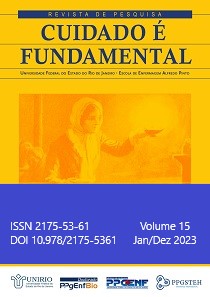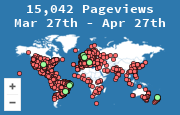CONDICIONES DE TRABAJO Y SÍNTOMATOLOGÍA DEPRESIVA EN ENFERMERAS DE CUIDADOS INTENSIVOS DURANTE LA PANDEMIA COVID-19
DOI:
https://doi.org/10.9789/2175-5361.rpcfo.v15.12757Palabras clave:
Depresión, Salud Ocupaciona, Unidades de cuidados intensivos, Condiciones de trabajo, COVID-19Resumen
Objetivo: analizar condiciones de trabajo asociadas a síntomas depresivos en enfermeras de cuidados intensivos durante la pandemia COVID-19. Método: investigación cualitativa, análisis de contenido; enfermeras de UTI de hospital de São Paulo/SP; entrevista con cuestionario semiestructurado. Resultados: 68 participantes de 9 UTI, mayoría del sexo femenino, 28-45 años; tiempo de egreso, trabajando en la institución, experiencia en la UTI de la institución e experiencia en enfermería UTI entre 1-8 años; sin otro trabajo; carga de trabajo semanal 38 - 60 h -más; 10 con diagnóstico previo de depresión, 16 con depresión leve, moderada. Condiciones de trabajo relacionadas a síntomas depresivos: sobrecarga por la intensidad de la carga de trabajo e ingreso de emergencia de profesionales no capacitados en la UTI; jefia ausente; colegas desinteresados; impotencia/sufrimiento de los pacientes, muertes; falta de material; miedo infectar familiares; discriminación familiar por estar en primera línea; miedo contagiarse. Influencia negativa en la asistencia prestada. Consideraciones finales: síntomas depresivos asociados a condiciones de trabajo inadecuadas en las UCI, agravadas por la pandemia COVID-19.
Descargas
Citas
PAHO. The COVID-19 health care workers study (HEROES): Informe regional de las Américas [Internet]. WASHINGTON, D.C: Organização Pan-Americana da Saúde; 2022 [cited 2022 Nov 1]. Available from: https://iris.paho.org/bitstream/handle/10665.2/55563/OPSNMHMHCOVID-19220001_spa.pdf?sequence=1&isAllowed=y.
Osório FL, Silveira ILM, Pereira-Lima K, Crippa JAS, Hallak JEC, Zuardi AW, et al. Risk and protective factors for the mental health of brazilian healthcare workers in the frontline of COVID-19 pandemic. Front psyc. [Internet]. 2021 [cited 2022 sep 10];12. Available from: https://doi.org/10.3389/fpsyt.2021.662742.
Varghese A, George G, Kondaguli SV, Naser AY, Khakha DC, Chatterji R. Decline in the mental health of nurses across the globe during COVID-19: A systematic review and meta-analysis. J. glob health. [Internet]. 2021 [cited 2022 sep 24];11:05009. Available from: https://doi.org/10.7189/jogh.11.05009.
Bergman L, Falk AC, Wolf A, Larsson IM. Registered nurses‘ experiences of working in the intensive care unit during the COVID-19 pandemic. Nurs. crit. care. [Internet]. 2021 [cited 2022 sep 22];26(6). Available from: https://doi.org/10.1111/nicc.12649.
Bardin L. Análise de conteúdo. Lisboa: Edições 70, 5 ed rev. Ampliada, 2018.
Fiocruz/COFEN. Perfil da enfermagem no Brasil: relatório final [Internet]. Rio de Janeiro; 2017 [acesso em 10 de setembro 2022]. Disponível em: http://www.cofen.gov.br/perfilenfermagem/pdfs/relatoriofinal.pdf.
Shalaby SA, Janbi NF, Mohammed KK, Al-harthi KM. Assessing the caring behaviors of critical care nurses. J. nurs. educ. Pract. [Internet]. 2018 [cited 2022 sep 7];8(10). Available from: https://doi.org/10.5430/jnep.v8n10p77.
Wihardja H, Hariyati TS, Gayatri D. Analysis of factors related to the mental workload of nurses during interaction through nursing care in the intensive care unit. Enferm. Clin. [Internet]. 2019 [cited 2022 sep 7];29(Suppl2). Available from: https://doi.org/10.1016/j.enfcli.2019.06.002.
Preti E, Mattei V, Perego G, Ferrari F, Mazzetti M, Taranto P, et al. The psychological impact of epidemic and pandemic outbreaks on healthcare workers: rapid review of the evidence. Curr. psychiatry rep. [Internet]. 2020 [cited 2022 oct 23];22(8). Available from: https://doi.org/10.1007/s11920-020-01166-z.
Ohue T, Togo E, Ohue Y, Mitoku K. Mental health of nurses involved with COVID-19 patients in Japan, intention to resign, and influencing factors. Medicinen [Internet]. 2021 [cited 2022 nov 30];100(31):e26828. Available from: https://doi.org/10.1097/MD.0000000000026828.
El-Hage W, Hingray C, Lemogne C, Yrondi A, Brunault P, Bienvenu T, et al. Health professionals facing the coronavirus disease 2019 (COVID-19) pandemic: What are the mental health risks?. L’Encéphale. [Internet]. 2020 [cited 2022 aug 27];46(3). Available from: https://doi.org/10.1016/j.encep.2020.04.008.
Ariapooran S, Ahadi B, Khezeli M. Depression, anxiety, and suicidal ideation in nurses with and without symptoms of secondary traumatic stress during the COVID-19 outbreak. Arch. psychiatr. nurs. [Internet]. 2022 [cited 2022 nov 6];37. Available from: https://doi.org/10.1016/j.apnu.2021.05.005.
Oliveira OC, Soares PJR. O impacto da pandemia de COVID-19 na saúde mental das equipes de enfermagem no Brasil e o enfrentamento frente a este desafio: revisão integrativa. RUNA. [Internet]. 2021 [acesso em 25 de setembro 2022]; Disponível em: https://repositorio.animaeducacao.com.br/handle/ANIMA/14866.
Sun N, Wei L, Shi S, Jiao D, Song R, Ma L, et al. A qualitative study on the psychological experience of caregivers of COVID-19 patients. Am. j. infect. control. [Internet]. 2020 [cited 2022 aug 20];48(6). Available from: https://doi.org/10.1016%2Fj.ajic.2020.03.018.
Lewis S, Willis K, Bismark M, Smallwood N. A time for self-care? frontline health workers’ strategies for managing mental health during the COVID-19 pandemic. SSM - Mental health. [Internet]. 2022 Dec [cited 2022 aug 27];2. Available from: https://doi.org/10.1016/j.ssmmh.2021.100053.
Fernández-Castillo RJ, González-Caro MD, Fernández-García E, Porcel-Gálvez AM, Garnacho-Montero J. Intensive care nurses' experiences during the COVID-19 pandemic: a qualitative study. Nurs. crit. care. [Internet]. 2021 [cited 2022 sep 3];26(5). Available from: https://doi.org/10.1111/nicc.12589.
Willis K, Ezer P, Lewis S, Bismark M, Smallwood N. “Covid just amplified the cracks of the system”: working as a frontline health worker during the COVID-19 pandemic. Int. j. environ. res. public health (Online). [Internet]. 2021 [cited 2022 aug 21];18(19). Available from: https://doi.org/10.3390/ijerph181910178.
Lin YP, Tang CJ, Tamin VA, Tan LYC, Chan EY. The hand-brain-heart connection: ICU nurses' experience of managing patient safety during COVID-19. Nurs. crit. care. [Internet]. 2022 [cited 2022 nov 3];27(5). Available from: https://pubmed.ncbi.nlm.nih.gov/34472664/.
Rhéaume A, Breau M, Boudreau S. A critical incident study of ICU nurses during the COVID-19 pandemic. Nurs. ethics. [Internet]. 2022 [cited 2022 aug 27];29(2). Available from: https://doi.org/10.1177/09697330211043270.
Gordon JM, Magbee T, Yoder LH. The experiences of critical care nurses caring for patients with COVID-19 during the 2020 pandemic: A qualitative study. Appl. nurs. res. [Internet]. 2021 [cited 2022 oct 30];59:151418. Available from: https://doi.org/10.1016/j.apnr.2021.151418
Hossain F, Clatty A. Self-care strategies in response to nurses’ moral injury during COVID-19 pandemic. Nurs. ethics. [Internet]. 2021 [cited 2022 sep 10];28(1). Available from: https://doi.org/10.1177/0969733020961825.
Guttormson JL, Calkins K, McAndrew N, Fitzgerald J, Losurdo H, Loonsfoot D. Critical care nurses‘experiences during the COVID-19 pandemic: A US national survey. Am. j. crit. care. [Internet]. 2022 [cited 2022 sep 25];31(2). Available from: https://pubmed.ncbi.nlm.nih.gov/34704108/.
Publicado
Cómo citar
Número
Sección
Licencia
Derechos de autor 2023 Revista de Pesquisa Cuidado é Fundamental Online

Esta obra está bajo una licencia internacional Creative Commons Atribución-NoComercial-CompartirIgual 4.0.
TERMO DE TRANSFERÊNCIA DE DIREITOS AUTORAIS
Transfiro os direitos autorais deste artigo para a Revista de Pesquisa Cuidado é Fundamental - Online - RPCF, assim que ele for aceito para a devida publicação eletrônica. Os direitos de autor incluem o direito de reproduzir na íntegra ou em parte por qualquer meio, distribuir o referido artigo, incluindo figuras, fotografias, bem como as eventuais traduções. O autor pode ainda, imprimir e distribuir cópias do seu artigo, desde que mencione que os direitos pertencem a RPCF. Declaro que este manuscrito é original, não tendo sido submetido à publicação, na íntegra ou em partes para outros periódicos online ou não, assim cmmo em Anais de eventos científicos ou capítulos de livros.






























